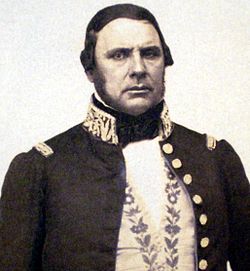Justo José de Urquiza
| Justo José de Urquiza | |
|---|---|
 |
|
| 3rd President of the Argentine Confederation | |
|
In office March 5, 1854 – March 4, 1860 |
|
| Vice President | Salvador María del Carril |
| Preceded by |
Himself as Provisional Director of the Argentine Confederation |
| Succeeded by | Santiago Derqui |
| Provisional Director of the Argentine Confederation | |
|
In office May 31, 1852 – March 4, 1854 |
|
| Preceded by | Office created |
| Succeeded by | Office abolished |
| 17th, 21st, 22nd & 24th Governor of Entre Ríos | |
|
In office May 1, 1868 – April 11, 1870 |
|
| Preceded by | José María Domínguez |
| Succeeded by | Ricardo López Jordán |
|
In office May 1, 1860 – April 30, 1864 |
|
| Succeeded by | José María Domínguez |
|
In office April 7, 1842 – September 10, 1852 |
|
| Preceded by | Francisco Dionisio Álvarez |
|
In office January 1, 1842 – January 28, 1842 |
|
| Preceded by | Vicente Zapata |
| Succeeded by | Pedro Pablo Seguí |
| Governor of Buenos Aires | |
|
In office July 26, 1852 – September 3, 1852 |
|
| Preceded by | Vicente López |
| Succeeded by | José Miguel Galán |
| Personal details | |
| Born |
October 18, 1801 Talar de Arroyo Largo, Entre Ríos |
| Died | April 11, 1870 (aged 68) San José Palace, Entre Ríos |
| Nationality | Argentine |
| Political party | Federalist Party |
| Spouse(s) | Segunda Calvento Dolores Costa Cruz López Jordán |
Justo José de Urquiza y García (Spanish pronunciation: [ˈxusto xoˈse ðe urˈkiθa]; October 18, 1801 – April 11, 1870) was an Argentine general and politician. He was president of the Argentine Confederation from 1854 to 1860.
Justo José de Urquiza y García was governor of Entre Ríos during the government of Juan Manuel de Rosas, governor of Buenos Aires with powers delegated from the other provinces. Rosas presented a resignation to his charge frequently, but only as a political gesture, counting that the other governments would reject it. However, in 1851, resentful of the economic and political dominance of Buenos Aires, Urquiza accepted Rosas' resignation and resumed for Entre Rios the powers delegated in Buenos Aires. Along with the resuming of international commerce without passing through the port of Buenos Aires, Urquiza replaced the "Death to the savage unitarians!" slogan with "Death to the enemies of national organization!", requesting the making of a national constitution that Rosas had long rejected. Corrientes supported Urquiza's action, but Rosas and the other provinces condemned the "crazy, traitor, savage, unitarian" Urquiza. Supported by Brazil and the Uruguayan liberals, he created the "Big Army" and forced Manuel Oribe to capitulate, ending the long siege of Montevideo in October 1851, and finally defeating Rosas on 3 February 1852 at the Battle of Caseros. The other provinces that supported Rosas against Urquiza's pronunciation changed sides and supported his project of creating a National Constitution.
Urquiza immediately began the task of national organization. He became provisional director of the Argentine Confederation in May 1852. In 1853, a constituent assembly adopted a constitution based primarily on the ideas of Juan Bautista Alberdi, and Urquiza was inaugurated president in March 1854.
...
Wikipedia
